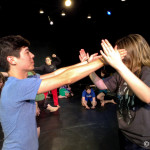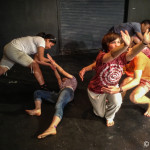 Session two started well, we had lost a few people but gained some new folks who couldn’t attend day one. We tried red ball again with much the same chaotic results, until one of the participants asked if we could try it whispering. Brilliant suggestion, the magic happened again, once they had a limitation to focus on overcoming they mustered their group super focus and just rocked it. Everyone managed to pass the objects to people all the way across the circle and be heard and understood using only their diction, no voice at all. Then we further explored ways to break up our natural speech patterns by playing with the line “This is hardly the moment to think of such things.” We played with speed and emphasis and my personal favorite, the unconcealed breath. We ended working with whispering again and one of the participants suggested whispering it in a round, we tried it, and it was gorgeous. So exciting that they are already thinking of ways to use these techniques in interesting ways.
Session two started well, we had lost a few people but gained some new folks who couldn’t attend day one. We tried red ball again with much the same chaotic results, until one of the participants asked if we could try it whispering. Brilliant suggestion, the magic happened again, once they had a limitation to focus on overcoming they mustered their group super focus and just rocked it. Everyone managed to pass the objects to people all the way across the circle and be heard and understood using only their diction, no voice at all. Then we further explored ways to break up our natural speech patterns by playing with the line “This is hardly the moment to think of such things.” We played with speed and emphasis and my personal favorite, the unconcealed breath. We ended working with whispering again and one of the participants suggested whispering it in a round, we tried it, and it was gorgeous. So exciting that they are already thinking of ways to use these techniques in interesting ways.
 We began the readings with “The Elephant Calf or The provability of any and every contention” by Bertolt Brecht. In this short interlude intended to be performed during the intermission of his full length play Man is Man (or Man Equals Man depending on translation) the characters from Man is Man put on a show for their fellow soldiers. The plot of their entertainment involves a baby elephant being tried for killing his mother, while the mother serves as a witness in the trial. In the play we see the “actors” talking to one another about the play, we see their performance, and we see the reaction of the audience. It is a veritable how to manual for Brecht’s desires for what theater should be at this stage in his career. At the end, the audience and performers are divided on whether the presented outcome is correct and we see them heading to the boxing ring to settle the matter. In Brechtland all plays end this way, right?
We began the readings with “The Elephant Calf or The provability of any and every contention” by Bertolt Brecht. In this short interlude intended to be performed during the intermission of his full length play Man is Man (or Man Equals Man depending on translation) the characters from Man is Man put on a show for their fellow soldiers. The plot of their entertainment involves a baby elephant being tried for killing his mother, while the mother serves as a witness in the trial. In the play we see the “actors” talking to one another about the play, we see their performance, and we see the reaction of the audience. It is a veritable how to manual for Brecht’s desires for what theater should be at this stage in his career. At the end, the audience and performers are divided on whether the presented outcome is correct and we see them heading to the boxing ring to settle the matter. In Brechtland all plays end this way, right?
Galy Gay: Very well, so we shall now see, I believe, whether it was truth that we staged here for you, or whether it was theater – good or bad – my fine fellows!
All off to the boxing match
-The Elephant Calf by Bertolt Brecht (Tr. E. Bently)
Our second reading was Ludwig Flaszen’s description of Jerzy Grotowski’s production of Akropolis. I have blogged about this selection before, so won’t give a long description here, but I will say that Grotowski’s choice to set a play meant to exult Western culture in an extermination camp, western culture’s greatest folly, seems bafflingly harsh to some, but when I asked this group if they would like to see this performance the majority reaction seemed to be well, duh, yeah! They all seemed to immediately see the appeal of a performance which draws the audience into the event as though they are participants in a ritual by witnessing the performance. When I told them that often audiences did not applaud at the end of the performances of Akropolis, they basically told me again, “well, duh, yeah, they were too affected by the performance and that’s a good thing.” So, no worries, guys, they get it. And don’t worry, I’m paraphrasing, they’re all waaay too smart to actually say, “well, duh.”
The mixture of incompatible elements, combined with the warping of language, brings out elementary reflexes. Remnants of sophistication are juxtaposed to animal behavior. Means of expression literally “biological” are linked to very conventional compositions. In Akropolis humanity is forced through a very fine sieve: its texture comes out much refined. – Ludwik Flaszen, from Akropolis: Treatment of the Text (tr. S. Sanzenbach) in Towards a Poor Theater
After the readings we did a little exercise I like to do on Grotowski day if it falls this early in the schedule (when it falls later, after they’ve had little more time to work together we do a mask exchange) where the participants are asked to create in themselves an overwhelming desire for an object they have chosen at random across the room and simultaneously not to let them selves reach that object. I have had several people tell me that this is one of the more memorable exercises they did in the workshop, I guess feeling overwhelming desire for exit signs and lighting instruments is something that sticks with you. But my favorite reason for doing this exercise is the opportunity it allows for discussing the way in which we can physically embody very complex psychological situations on stage with only action and imagery, no dialogue or exposition needed. Another trick for our bag!


Leave a Reply
You must be logged in to post a comment.